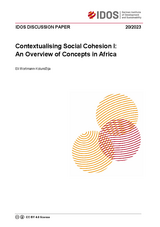Contextualising social cohesion I: an overview of concepts in Africa
Wortmann-Kolundžija, EliDiscussion Paper (20/2023)
Bonn: German Institute of Development and Sustainability (IDOS)
ISBN: 978-3-96021-223-2
DOI: https://doi.org/10.23661/idp20.2023
Preis: 6 €
The social fragmentation of societies is one of the greatest challenges for peace, democracy and human rights worldwide. For some years now, observers have been witnessing ever-stronger tendencies towards social division, also in Western societies, which had been believed to be united for so long. Rising inequality, the rejection of previously shared values and growing scepticism towards public institutions suggest that social cohesion is at risk. Against this background, it seems more important than ever to understand what factors hold a society together – and when such cohesion is most vulnerable. Protecting and strengthening social cohesion has therefore become an objective of many activities at the local, national and international levels, and academics have started to develop methodologies on how to measure social cohesion (see, with further references: Leininger et al., 2021).
This paper aims:
• to give a systematic overview of the literature on African concepts of social cohesion;
• to introduce the discourse around African concepts and to see which relevant concepts of social cohesion can be located in African societies;
• to analyse in more detail some key African concepts and their core elements and to see which conceptual dimensions and insights on determinants of social cohesion differ from the mainstream, while inviting scholars to add further to this listing; and, in particular
• to gain a better understanding of the academic discourse on social cohesion in Africa by analysing the concepts, determinants, origins and context of social cohesion theories as well as the risk of Western bias in identifying concepts for social cohesion in the African context.
One of the questions that inspired the present research project is how we could better understand which relevant concepts of social cohesion in African societies are particularly emphasised by African scholars and how “Western” concepts of social cohesion relate to the various African academic approaches to the topic. Further research questions that were raised in the context of the present paper are:
• How can traditional knowledge and African social theories contribute towards contextualising the debate on social cohesion in Africa?
• What are the key aspects of the concepts of social cohesion in selected African countries, and how can these be analysed?
• How did pre-colonial societies in Africa understand social cohesion, and what insights can be gained from this?
Methodologically, we identify and analyse concepts within the African context in order to gain insights into basic elements of social cohesion. This literature review draws on different sources such as ethnophilosophy, political philosophy, religion, culture, economics and international discourses. This literature review is the first part of an assessment of concepts of social cohesion in Africa. It is followed by a systematic comparison of social cohesion concepts in specific African countries.
The academic benefit is to identify the current state of research on social cohesion in Africa, to identify the need for further research and to deepen the understanding of the phenomenon of social cohesion. In addition, we aim to deliver developmental value through these publications by helping decision-makers come to evidence-based decisions and synthesise as well as make use of scientific evidence for development practice.

